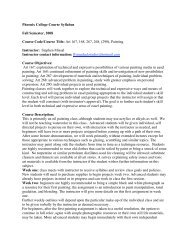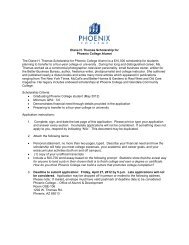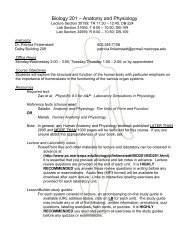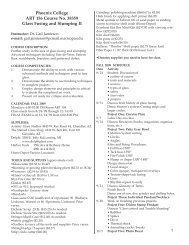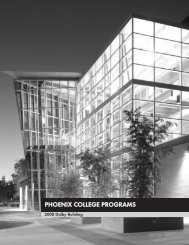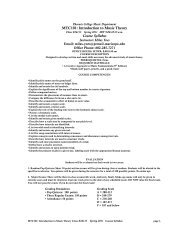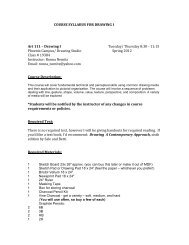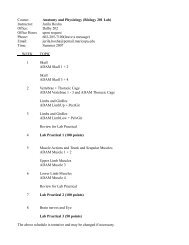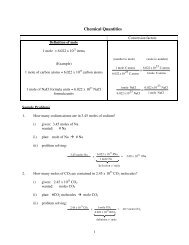Phoenix College Catalog 2009-10
Phoenix College Catalog 2009-10
Phoenix College Catalog 2009-10
You also want an ePaper? Increase the reach of your titles
YUMPU automatically turns print PDFs into web optimized ePapers that Google loves.
240 | <strong>Phoenix</strong> <strong>College</strong> <strong>2009</strong>–20<strong>10</strong> CATALOG<br />
Course Descriptions<br />
ASB223<br />
Buried Cities and Lost Tribes:<br />
New World<br />
3 credit(s) 3 period(s) lecture<br />
Introduction to archaeology through<br />
discoveries and the researchers who made<br />
them. Emphasis on methods of archaeological<br />
fieldwork and what these discoveries reveal<br />
about humanity, including the nature of<br />
archaeological inquiry, the development of<br />
human social groups, the changing role of<br />
religion in evolving societies, the origins of<br />
agriculture, the origins of settled lifeways,<br />
the rise of cities and complex societies,<br />
political strife across different cultures and<br />
the forces which fragment societies.<br />
Examples drawn from North American,<br />
Central America, and South America.<br />
Prerequisites: None.<br />
ASB235<br />
Southwest Archaeology<br />
3 credit(s) 3 period(s) lecture<br />
Anthropological perspective and comparative<br />
study of the cultures of prehistoric native<br />
peoples of the North American southwest.<br />
Prerequisites: None.<br />
ASB245<br />
Indians of the Southwest<br />
3 credit(s) 3 period(s) lecture<br />
Comparative study of the cultures, including<br />
the histories and present status, of Indians<br />
of the Southwest. Prerequisites: None.<br />
ASM<strong>10</strong>4<br />
Bones, Stones, and Human Evolution<br />
4 credit(s) 5 period(s) lecture + lab<br />
Study of human evolution and variation;<br />
including fossil hominids and their tools,<br />
primate anatomy and behavior, human<br />
genetics, and the environment and human<br />
biology. Prerequisites: None.<br />
ASM/FOR275<br />
Introduction to Forensic Anthropology<br />
3 credit(s) 3 period(s) lecture<br />
Introduction to forensic anthropology. Survey<br />
of the role of forensic anthropologist, from<br />
the crime scene to the courtroom.<br />
Understand how a forensic anthropologist<br />
can determine life history of an individual.<br />
Contributions of forensic anthropology to<br />
crime scene and other legal investigations.<br />
How forensic anthropology is used to<br />
decipher historic cases, and how it is<br />
depicted in popular culture. Case studies<br />
involving criminal investigations, mass<br />
disaster incidents, and global human rights<br />
issues. Prerequisites: None.<br />
AST– Astronomy<br />
AST<strong>10</strong>1<br />
Survey of Astronomy<br />
3 credit(s) 3 period(s) lecture<br />
Survey of astronomy for the non-technical<br />
student. The history, contents, and evolution<br />
of the solar system and the universe in<br />
general. Astronomical principles and<br />
instrumentation. The planets, moons, sun,<br />
comets, stars and star formation, galaxies,<br />
and cosmology Prerequisites: None.<br />
AST<strong>10</strong>2<br />
Survey of Astronomy Laboratory<br />
1 credit(s) 3 period(s) lab<br />
Astronomical observations and exercises<br />
designed to familiarize students with the<br />
sky, telescopes, and methods used in<br />
astronomy. Prerequisites: None. May<br />
accompany AST<strong>10</strong>1.<br />
AST111<br />
Introduction to Astronomy I<br />
3 credit(s) 3 period(s) lecture<br />
Introduction to astronomy for the nonscience<br />
major. History of astronomy,<br />
properties of light, instruments, the solar<br />
system and nearby stars. Prerequisites:<br />
MAT092 or equivalent.<br />
AST112<br />
Introduction to Astronomy II<br />
3 credit(s) 3 period(s) lecture<br />
Introduction to astronomy for the nonscience<br />
major. Structure and evolution of<br />
stars; star clusters; galaxies; cosmology.<br />
Prerequisites: MAT092 or equivalent.<br />
AST113<br />
Astronomy I Laboratory<br />
1 credit(s) 3 period(s) lab<br />
Astronomical observations and exercises to<br />
supplement AST111. Prerequisites or<br />
Corequisites: AST111.<br />
AST114<br />
Astronomy II Laboratory<br />
1 credit(s) 3 period(s) lab<br />
Astronomical observations and exercises to<br />
supplement AST112. Prerequisites or<br />
Corequisites: AST112.<br />
BIO – Biology<br />
BIO<strong>10</strong>0<br />
Biology Concepts<br />
4 credit(s) 6 period(s) lecture & lab<br />
A one-semester introductory course<br />
covering basic principles and concepts of<br />
biology. Methods of scientific inquiry and<br />
behavior of matter and energy in biological<br />
systems are explored. Field trips may be<br />
required at students' expense.<br />
Prerequisites: None.<br />
BIO<strong>10</strong>5<br />
Environmental Biology<br />
4 credit(s) 6 period(s) lecture & lab<br />
Fundamentals of ecology and their relevance<br />
to human impact on natural ecosystems.<br />
Field trips may be required at students'<br />
expense. Prerequisites: None.<br />
BIO<strong>10</strong>7<br />
Introduction to Biotechnology<br />
4 credit(s) 6 period(s) lecture & lab<br />
Introduction to biotechnology and its global<br />
impact on society. Covers applications,<br />
laboratory techniques, limitations and the<br />
international economic benefits, risks, and<br />
legal and moral issues associated with<br />
biotechnology. Prerequisites: None.<br />
BIO<strong>10</strong>8<br />
Plants and Society<br />
4 credit(s) 6 period(s) lecture & lab<br />
A global study of plants in relation to humans;<br />
as a source of food, fiber, drugs, and other<br />
products; for aesthetic value, survival, and<br />
energy. Prerequisites: None.<br />
BIO<strong>10</strong>9<br />
Natural History of the Southwest<br />
4 credit(s) 6 period(s) lecture & lab<br />
Study of the common plants and animals of<br />
the Southwest including their distribution,<br />
adaptation, behavior, and ecology.<br />
Introduction to basic field and laboratory<br />
techniques used in the study of natural<br />
history. Specific field problems presented<br />
dealing with plant and animal analysis and<br />
ecological interrelationships. Prerequisites:<br />
None. Course Note: Field trips may be<br />
required.<br />
BIO145<br />
Marine Biology<br />
4 credit(s) 6 period(s) lecture & lab<br />
A survey of marine environments and their<br />
biotic communities with emphasis on the<br />
natural history of marine organisms.<br />
Prerequisites: None.<br />
BIO148<br />
Coral Reef Ecology<br />
1 credit(s) 1 period(s) lecture<br />
Introduction to ecology of coral reefs.<br />
Emphasis on reef environments, corals, reef<br />
fishes, and human impacts on reefs.<br />
Prerequisites: None.<br />
BIO149<br />
Field Biology Modules AF-AO<br />
0.5-4 credit(s) 3.5-28 period(s) lab<br />
Field expeditions designed to study natural<br />
history of selected geographical locations.<br />
Field observations of behavior, distribution,<br />
and adaptations of organisms within natural<br />
communities emphasized. May be repeated<br />
for up to four hours of elective credit.<br />
Prerequisites: None.



